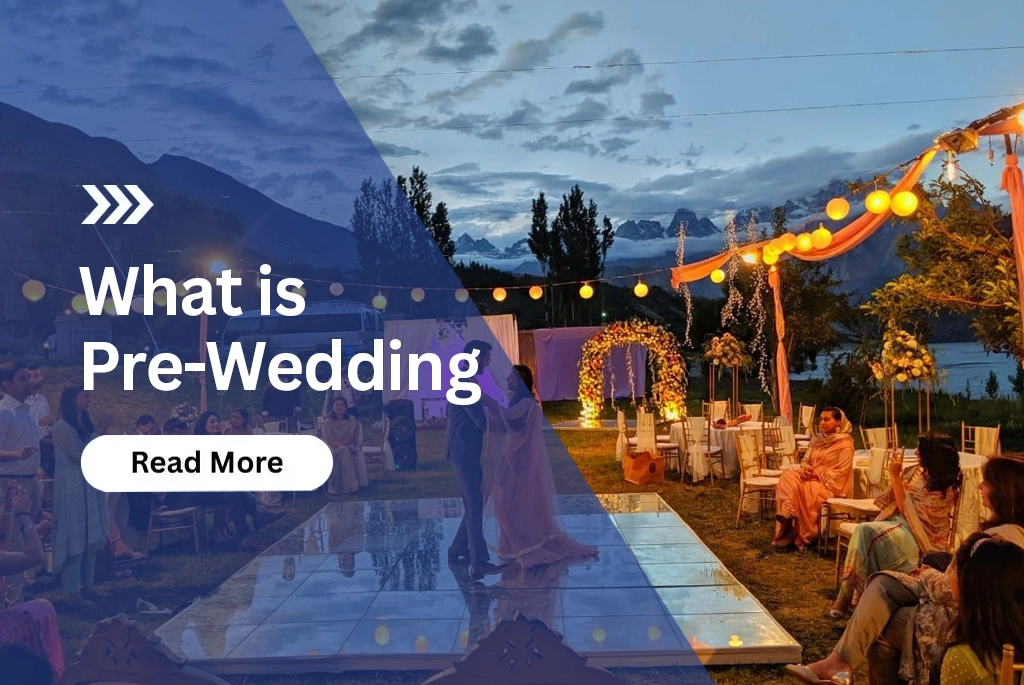Pre-wedding is all that comes before a formal wedding. It will involve such activities as pre-wedding parties, traditions, and bonding that will consist of both families. They indicate the wedding and give the loved ones a chance to rejoice in the upcoming union of the couple.
Why Are Pre-Wedding Events So Important?
- They build excitement: Pre-wedding ceremonies like Mehndi and Dholki generate energy and enthusiasm as the couple prepares for their big day.
- They honor tradition: Pakistani pre-wedding customs are rich in culture and religion, helping the couple connect with their roots.
- They create lasting memories: These events allow the couple and their families to bond and create special memories before the wedding day.
Now that you know what pre-wedding means, let’s dive into the most popular pre-wedding events in Pakistan, how they are organized, and why they’re so special.
1. Mangni (Engagement Ceremony)
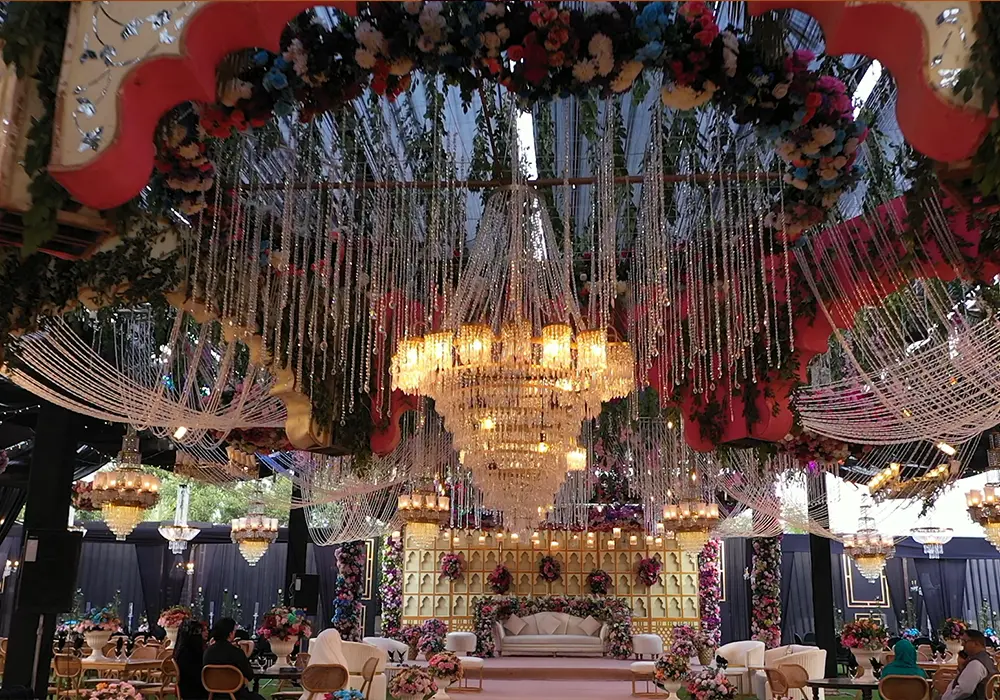
What is it?
Mangni, or the engagement ceremony, is one of the first pre-wedding events. During Mangni, the bride and groom exchange rings, marking the official start of their journey to marriage. It’s a smaller gathering of close family and friends, setting the tone for the bigger celebrations ahead.
How to Organize:
- Venue: Mangni is typically hosted at the bride’s or groom’s house or a small hall. Choose a location with enough space for close family and friends.
- Decorations: Keep the décor simple but elegant. You can use flowers, candles, and traditional decorations to set the mood.
- Gifts: Both families exchange small gifts as a gesture of goodwill and blessings.
- Program: Usually, the event involves a few speeches, a ring exchange, and prayers for the couple.
Importance:
- Commitment: Mangni marks the official engagement of the couple.
- Blessings from Families: It’s a time for both families to bless the couple and share their joy.
- Formal Introduction: This is the first time the couple’s families have come together officially.
2. Mayun (Pre-Wedding Seclusion)
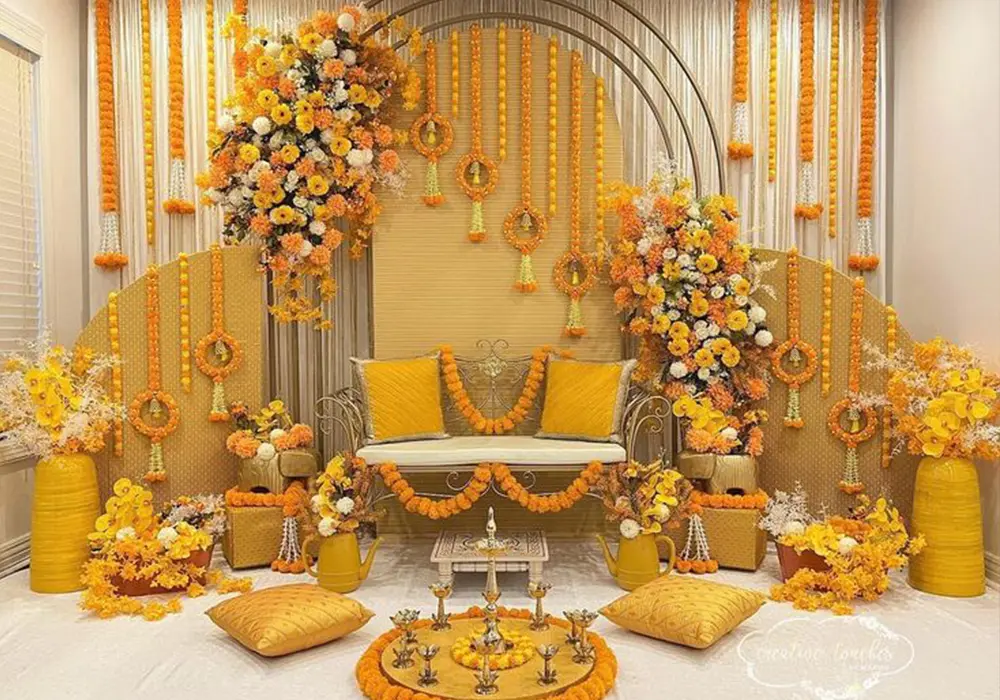
What is it?
Mayun is a traditional pre-wedding ceremony where the bride undergoes a beauty ritual. She is given a turmeric (ubtan) treatment, which is thought to purify her skin and bring a natural glow before the wedding. Mayun is a more intimate event, where close female relatives and friends come together to celebrate the bride’s journey.
How to Organize:
- Venue: The bride’s home is usually the venue for this event. Make sure the space is comfortable and has a cozy atmosphere.
- Ritual: The bride applies ubtan (turmeric paste) to her face and body, with her relatives singing traditional songs. This is a very personal, intimate moment.
- Activities: Organize games or light-hearted activities to keep the atmosphere fun and relaxed.
- Outfit: The bride typically wears yellow clothes, as it symbolizes warmth, prosperity, and good fortune.
Importance:
- Cultural Tradition: It’s a beautiful, culturally significant ritual that has been passed down for generations.
- Purification: The treatment is believed to purify the bride before the wedding.
- Bonding: It gives the bride time to bond with her closest friends and family members before the big day.
3. Dholki (Music and Dance Celebration)
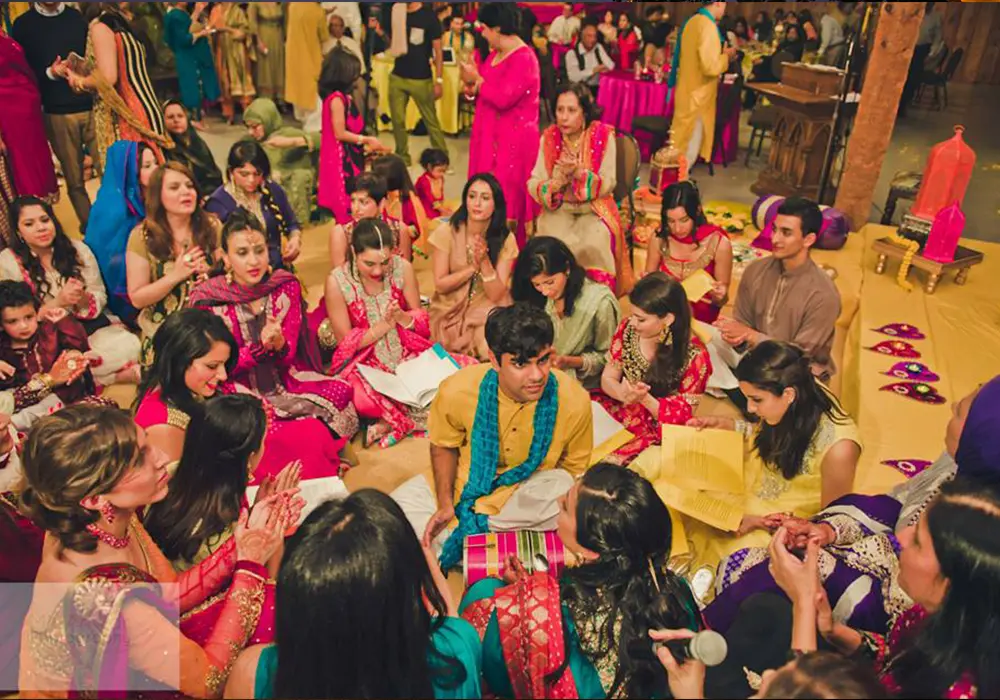
What is it?
Dholki is an energetic pre-wedding party where friends and family gather to play traditional music, sing, and dance. The groom’s side and bride’s side each host their own Dholki, and it’s filled with fun and excitement. The dhol (drum) is played, and traditional songs are sung, often with playful lyrics about the bride and groom.
How to Organize:
- Venue: Dholki can be hosted at home, but some people prefer renting a small hall for larger gatherings.
- Music: The dholki is all about music! Arrange for a dhol player, or you can play traditional wedding songs and folk music.
- Food and Drinks: Serve snacks and light refreshments for the guests.
- Attire: Traditional attire for everyone makes the event more special—think colorful clothes and comfortable shoes for dancing.
Importance:
- Celebration: Dholki is a way to celebrate the joy and anticipation surrounding the wedding.
- Community Involvement: Everyone in the community comes together for this lively celebration.
- Cultural Expression: It’s an opportunity to showcase Pakistan’s rich musical and dance traditions.
4. Mehndi (Henna Ceremony)
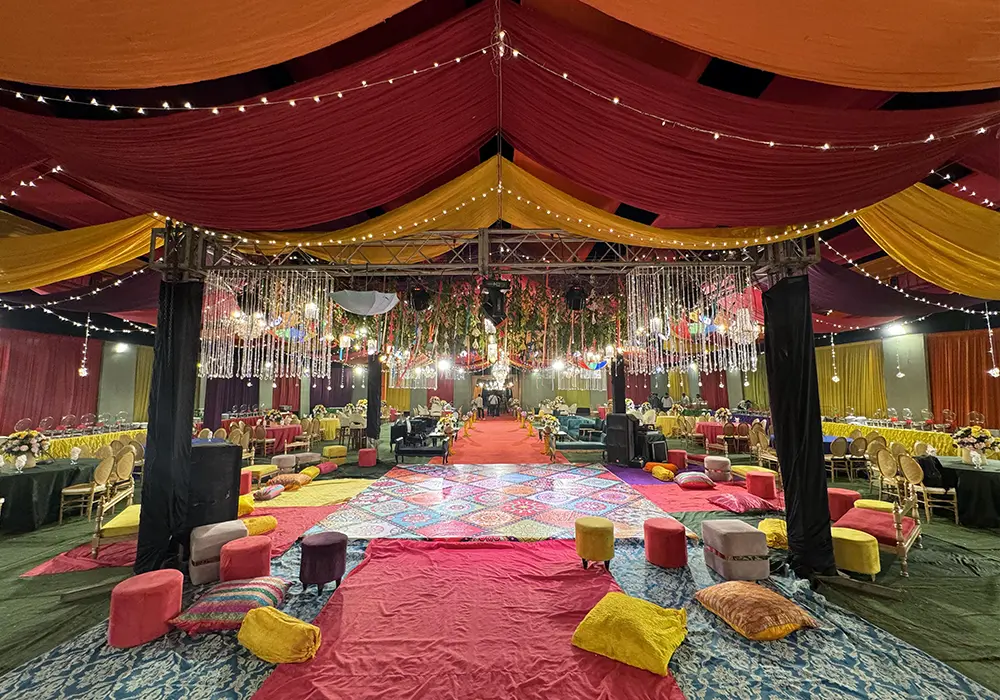
What is it?
Mehndi is one of the most exciting pre-wedding ceremonies. It’s a night dedicated to applying henna (mehndi) to the bride’s hands and feet. The ceremony involves singing, dancing, and loads of fun. The bride is adorned with intricate henna designs, symbolizing good luck and joy.
How to Organize:
- Venue: Mehndi is typically a more elaborate event held at a large hall or the bride’s home.
- Henna Application: Hire a professional henna artist or allow friends and family to do the henna designs.
- Music and Dance: Arrange for a DJ or live band to play traditional and contemporary music for dancing.
- Attire: Bright, festive colors are ideal—think bright pinks, greens, and yellows!
Importance:
- Symbol of Good Luck: Henna is believed to bring good fortune to the bride and groom.
- Joyful Celebration: Mehndi is often considered the most fun of all pre-wedding ceremonies.
- Family Bonding: It’s a time for both families to come together in celebration.
5. Bridal Shower
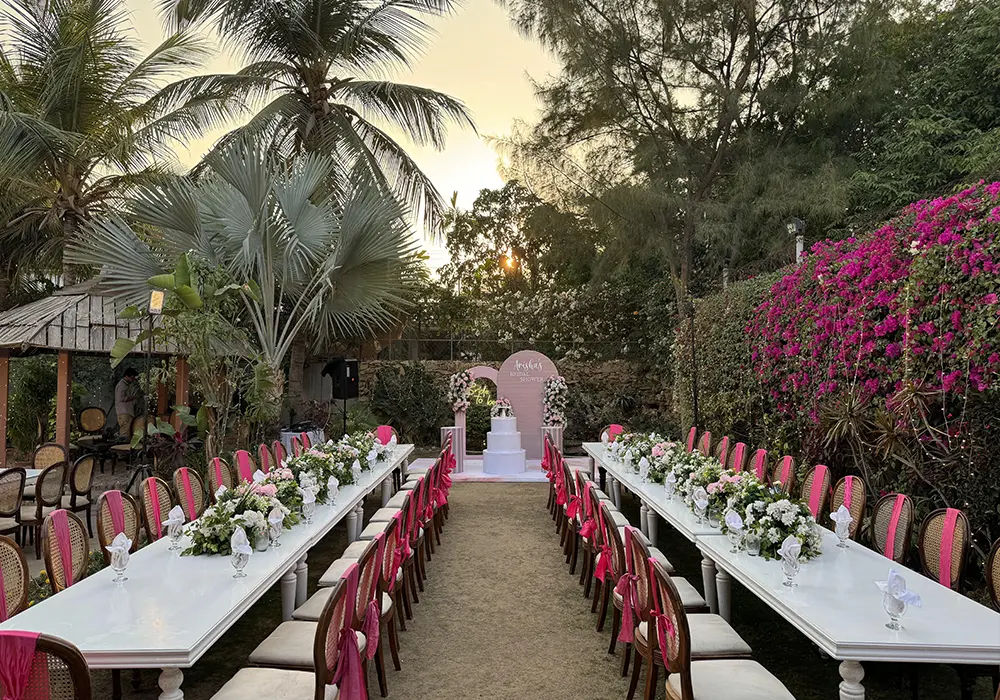
What is it?
The Bridal Shower is a fun, casual pre-wedding party for the bride, often organized by her closest friends. It’s a celebration where she receives gifts to help her begin her married life.
How to Organize:
- Venue: The Bridal Shower is usually hosted at a home, restaurant, or café. It’s a relaxed, intimate setting.
- Games: Plan fun games like “How Well Do You Know the Bride” or “Guess the Groom’s Favorite.”
- Gifts: Have a gift registry for guests or a casual gift exchange.
Importance:
- Gifts for the Bride: It helps the bride get things she’ll need for her new life.
- Relaxed Atmosphere: The Bridal Shower is a fun and easy-going event.
- Celebrating the Bride: It’s all about showing love and excitement for the bride before the wedding.
6. Bachelor’s Night (Bachelorette Party)

What is it?
Bachelor’s Night or the Bachelorette Party is the bride and groom’s last night out before they get married. It’s typically a fun celebration with their closest friends, whether it’s a night of dancing or a quiet get-together.
How to Organize:
- Venue: You can opt for a night out in the city or a more relaxed evening at home with friends.
- Games and Fun: Plan a few games or activities to keep the fun going.
- Attire: Casual or themed outfits, depending on the style of the party.
Importance:
- Final Night of Singlehood: It’s the last chance for the bride and groom to celebrate being single.
- Relaxation and Fun: This is an opportunity to unwind before the wedding.
- Making Memories: Creating fun memories with friends before the big day.
7. Nikah (Islamic Marriage Contract)
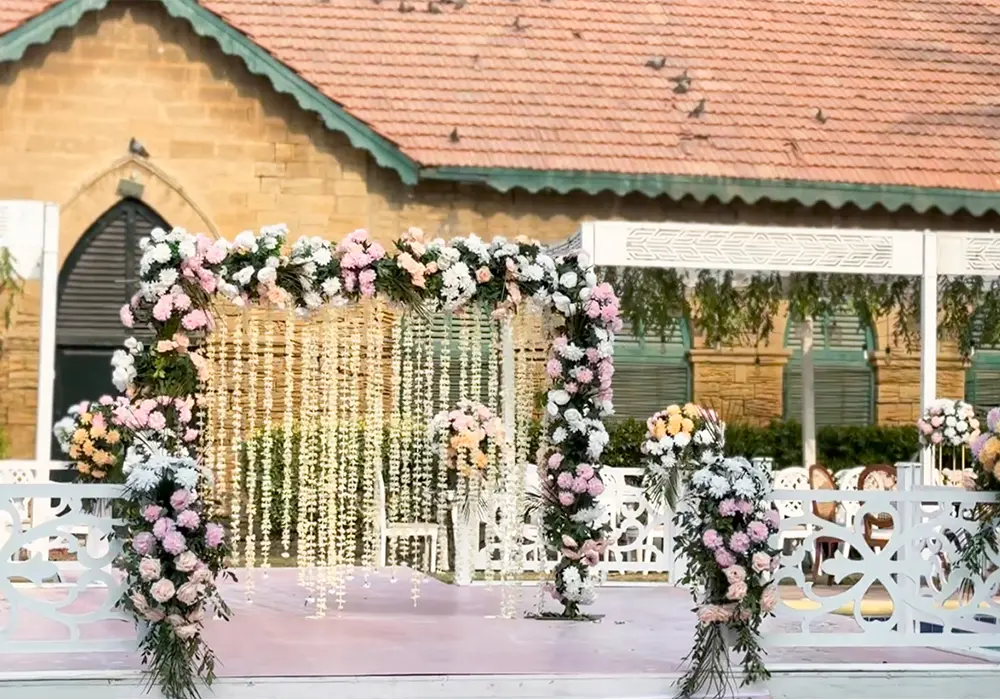
What is it?
The Nikah is the formal religious marriage ceremony where the bride and groom sign the marriage contract. It’s a simple but powerful ceremony where vows are exchanged.
How to Organize:
- Venue: The Nikah ceremony is often held at a mosque or at home with an imam to lead the ceremony.
- Witnesses: You will need two male witnesses to sign the marriage contract.
- Ceremony: Keep it simple, with prayers and blessings.
Importance:
- Religious and Legal Union: Nikah officially binds the couple in marriage.
- Blessings: It’s a significant religious ceremony in the eyes of Islam.
- Simplicity: It’s a straightforward ceremony that carries deep meaning.
Our Final Verdict
Pre-wedding events in Pakistan follow a well-defined sequence, beginning with the Mangni and leading up to the Nikah. Each ceremony has its own purpose—whether it is marking commitment, honoring traditions, strengthening family ties, or celebrating with music and dance.
Together, they create the foundation for the wedding day, ensuring that by the time the formal union takes place, the couple and their families have shared meaningful rituals, joyful moments, and cultural expressions that make the wedding a complete and memorable experience.

